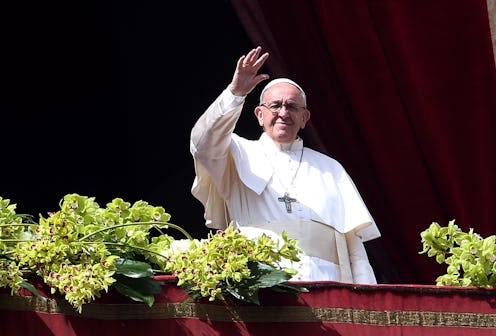News
What The Pope Told A Gay Man About God Is A New Direction For The Catholic Church

The Catholic Church has not exactly been accepting of homosexuality in the past. However, a private conversation between Pope Francis and a gay clerical abuse survivor, Juan Carlos Cruz, might have signaled a shift in theology — or, at least, a pope who's willing to ignore that particular teaching. Pope Francis told the gay man "God loves you like this," CNN reported.
Cruz suffered abuse at the hands of a Chilean priest, who was found guilty of that abuse in 2011. In the years since, more attention has been brought to the widespread abuse in the country, and all of the bishops in Chile resigned just last week over the scandal. CNN wrote that in April of 2018, Cruz spent three days with Pope Francis in the Vatican City to discuss his experiences, both with the abuse and with his sexuality. In an interview with CNN, Cruz then said that the Pope had expressed his support for Cruz.
"You know Juan Carlos, that does not matter. God made you like this. God loves you like this. The Pope loves you like this and you should love yourself and not worry about what people say," the pope said, according to Cruz.
When CNN reached out for comment, a spokesperson at the Vatican said that they "do not normally comment on the Pope's private conversations."
According to Catholic.com, acting on homosexual desires is always a "[violation] of divine and natural law," although the desires themselves are not in themselves sinful. USCatholic.org wrote that the Vatican put out a declaration in 1975 on sexual ethics, which said that "Homosexual acts are intrinsically disordered and can in no case be approved of." According to the same source, the Catholic Church in the U.S. has, at various times, supported organizations meant to "help [gays and lesbians] remain celibate." In 2005, Pope Benedict XVI said that while the Church respected the gay community, "those who practice homosexuality, present deep-seated homosexual tendencies or support the so-called 'gay culture'" could not join a seminary or a holy order — a sentiment that the Church, under Pope Francis, has repeated.
Despite the Church's so-far unchanged stance on the issue, Pope Francis has personally made comments that suggest that he views it differently. In 2013, the BBC reported that Pope Francis had said "who am I to judge" in response to a question about whether there was a "gay lobby" active in the Vatican.
"If a person is gay and seeks God and has good will, who am I to judge?" the pope said. Then, USCatholic.org wrote that in 2016, he said that same-sex unions, while still not at the same level as marriage, could "offer a certain stability" for a family.
Catholic media outlet Crux, however, emphasized that Pope Francis' words have not amounted to an endorsement of homosexuality. Instead, Crux wrote that Francis has made it clear that members of the LGBTQ community should be accepted and welcomed.
“When a person (who is gay) arrives before Jesus, Jesus certainly will not say, ‘Go away because you are homosexual,'” Crux reported that Francis said in 2016.
In interviews with the Guardian, then, multiple experts backed up the assumption that Francis' statements, while forward-thinking, did not mean that the church was any closer to amending its theology.
“I don’t think he has changed church teaching but he’s demonstrating an affirmation of gay Catholics, something that has been missing over the years in Rome,” said Vatican correspondent Christopher Lamb. Austen Ivereigh, a biographer of Pope Francis, told the Guardian that these were Francis' most “forceful” words on the topic so far, but that any change in the Church's official approach would have to come in the form of a formal pronouncement.
Still, though, affirmation is affirmation, especially in an organization as resistant to change as the Church, and Pope Francis has gone farther than any of his predecessors in making it a slightly more welcoming place for the LGBTQ community.